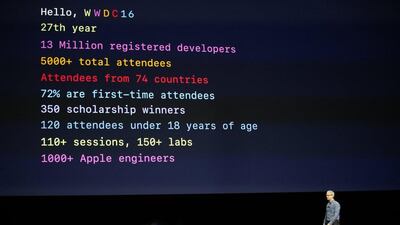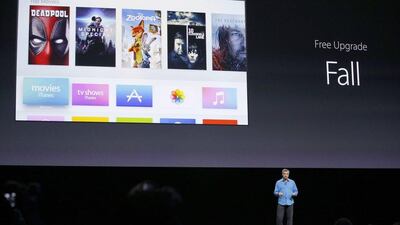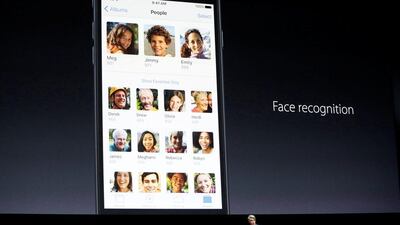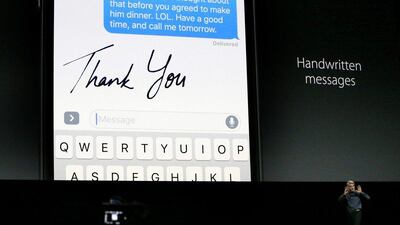Apple showed off new software, including improvements to iMessage and its voice-activated assistant Siri, to help fend off competition from technology giants who are encroaching on the iPhone maker’s services businesses.
Expanding Siri’s reach may keep products from Amazon.com and Alphabet’s Google at bay, more fun emojis and integrated applications for messaging could hold off challenges from Facebook and Tencent Holdings, and expanding Apple Pay to online shopping pushes back at PayPal Holdings. A revamped Apple Music streaming service is aimed at winning customers of Spotify AB.
Apple executives introduced the new products Monday at the company’s Worldwide Developers Conference in San Francisco. The annual event has taken on greater importance as Apple seeks to offset a slowdown in iPhone sales by increasing its software income. The company gets a cut of every sale made via its App Store and to keep developers building the apps, chief rxecutive Tim Cook anchored a presentation showing they’ll now be able to integrate a bevy of Apple services into their programmes.
The new operating systems for Mac computers, Apple Watch, Apple TV and iPhones “become even more capable when working with all of you,” Cook told about 5,000 developers gathered in San Francisco’s Bill Graham Civic Auditorium.
“The event was largely incremental and a warm up for new products in the fall,” Gene Munster, an analyst at Piper Jaffray, wrote in a note to investors. “The updates keep Apple’s hardware and software ahead of competition from Android, Amazon and Windows.”
The opening of Siri to third-party developers may ultimately allow users to order pizzas or taxis with voice commands. That regains ground on Amazon and Google, which have released virtual assistants since Apple introduced Siri in 2011. Apple also added its voice-activated assistant to its desktop and laptop computers.
Virtual assistants are playing an increasingly key role in managing the way consumers operate their digital lives: interacting with social media, arranging calendars, ordering shopping and running homes with web-connected appliances. Technology companies are investing in their virtual assistants as they compete to become the gatekeeper for those products.
Messaging Features
Apple’s changes to its iMessage system drew the biggest reaction at the conference. Developers will be able to incorporate apps into iMessage so users can do more tasks like make payments or order take-out food. And Apple introduced consumer-friendly features like bigger emojis, quick-reply options such as a thumbs-up and special animations like pulsing lights or floating balloons - all similar to those available on SnapChat or Facebook Messenger.
Apple is following the lead of Facebook chief executive Mark Zuckerberg, who sees messaging applications as the tools people will use to do everything from chatting with customer service representatives and getting sports updates to booking taxis or paying restaurant bills. This model has been popular for years in China, where Tencent’s WeChat app is used by millions of consumers for banking, buying and keeping tabs on celebrity updates. Facebook’s WhatsApp, with about 1 billion users, and Messenger, with about 900 million, both consistently rank among the top downloads on Apple’s App Store.
Apple Pay
Starting in the fall, consumers using Apple’s Safari browser on their Mac computers, iPhones or iPads can buy items online with Apple Pay by swiping their finger across an iPhone sensor, as they do when shopping in physical stores. Authentication can also be done using an Apple Watch.
“Apple Pay in browser limited to Safari is going to be a tough one to swallow for many,” said Ben Bajarin, an analyst at Creative Strategies, wrote on Twitter.
Still, the move online is a blow to companies like PayPal, which offers shoppers one-click payment, said Roger Entner, an analyst with Recon Analytics. PayPal also lets users of certain devices log into their accounts with a fingerprint reader.
“For PayPal, it’s pretty much a direct attack on their core business,” Entner said in an interview. “If Apple figures out a more convenient way of going through the authentication process, customers that have Apple Pay may pick that and not use PayPal.”
Music Streaming
Apple introduced a revamped version of its music streaming service aimed at making it easier to use. Since it was unveiled at last year’s developer conference, Apple Music has been plagued by slow adoption rates, lukewarm critical reception and executive departures.
Among the changes are altered tabs along the bottom of the app to improve navigation, a tab to publicise new music releases and a browsing function that will show fewer album covers and songs than the first version of the service.
A consumer shift toward music streaming from Spotify and Pandora poses a threat to Apple’s $3.5 billion iTunes song-download business. Apple said Monday that its music-streaming service has more than 15 million paid subscribers, up from 13 million at the end of March. That compares with Spotify’s 30 million paying customers and Pandora’s 3.9 million subscribers at the end of 2015.
Apple TV
The new version of the tvOS system will enable you to sign in once to access multiple apps from various TV network providers. It’s also adding services like Dish’s Sling TV and Fox Sports Go.
There’s also better integration with the Siri voice assistant. You can launch live TV viewing with voice command and search YouTube and the iTunes store for videos using Siri.
The company also enabled Apple TV to interact with photos stored in Apple’s online locker, iCloud, and interact with smart home devices such as thermostats that use the company’s HomeKit platform.
business@thenational.ae
Follow The National's Business section on Twitter








